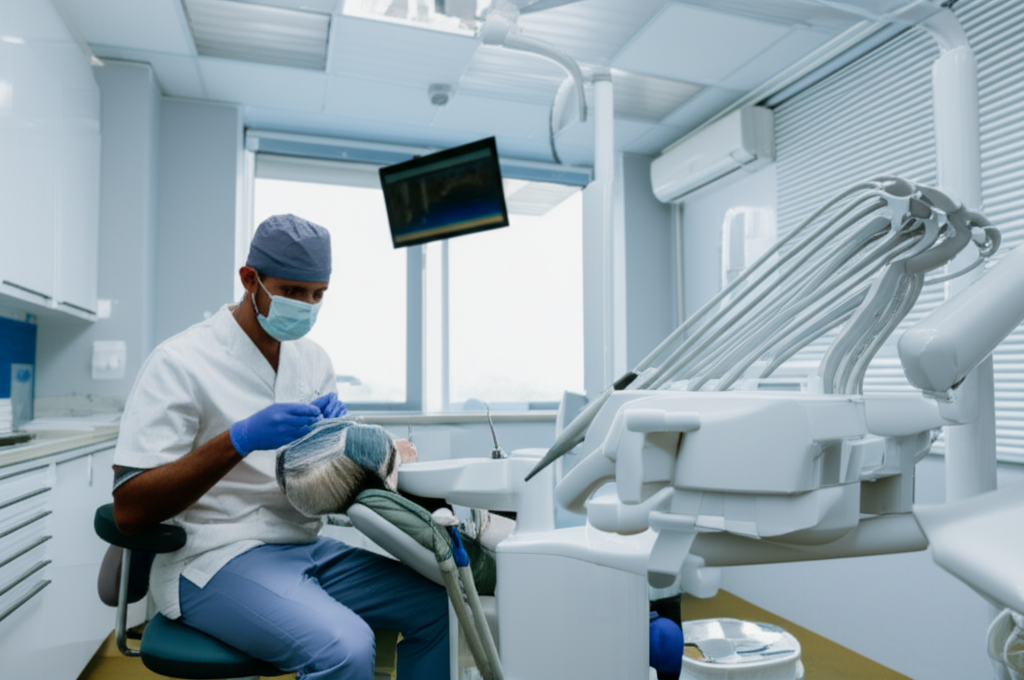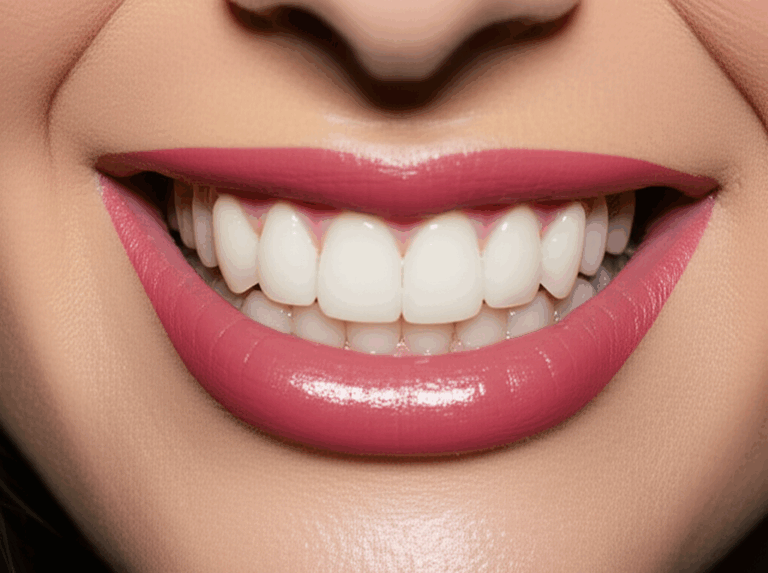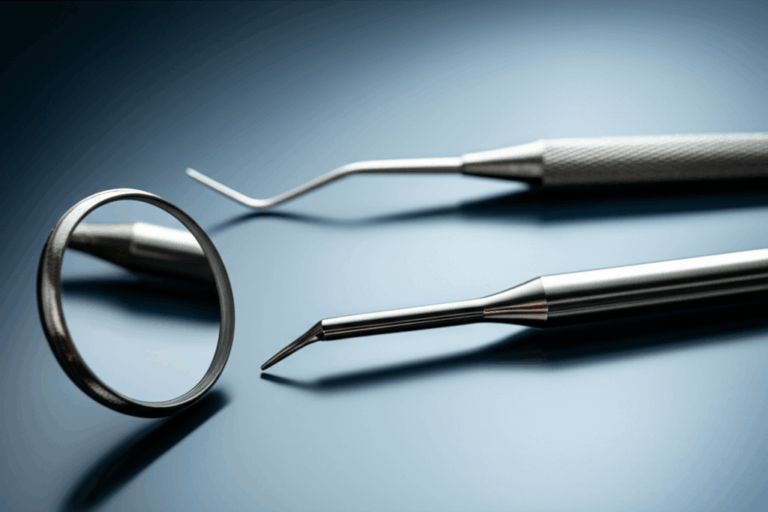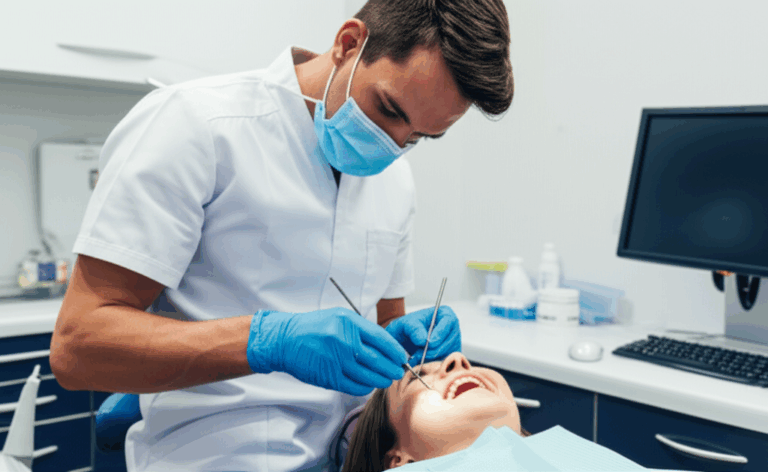
How to Become a Dentist in Dubai: Your Complete Guide to Licensing, Jobs, and Relocation
You might be asking: “How do I work as a dentist in Dubai?” A lot of dentists around the world look at Dubai for its good clinics, tax-free pay, and mix of patients. The process can seem confusing at first. There are different licensing bodies, you’ll hear about something called DataFlow, and there are tests with odd names like CBT and OSCE. You also need to handle visas and work contracts. This guide makes the process simple so you know what to do.
In simple words: You pick the right licensing body depending on where you want to work. You make sure your degrees and job history are real with DataFlow. You pass a qualifying test. Then you look for a job and get a work visa through your new boss. After that, you start building your network, find your place in Dubai, and keep your license valid by doing extra learning. We’ll walk you through every step.
You’ll learn what documents are needed, how DHA, MOHAP, and DHCC are different, and how to get ready for the CBT or OSCE. We’ll talk about salaries, reading labor contracts, choosing where to live in Dubai, and give you real tips from other expat dentists.
By the end, you’ll know:
- Your next three tasks
- Where to look for official information
This move is big. But with a clear road map, you can do it confidently.
Table of Contents
- Why Dubai for Dentists?
- Know the Licensing Authorities: DHA, MOHAP, and DHCC
- Are You Eligible? Documents and Criteria
- Step-by-Step: How to Get Your Dental License in Dubai
- The Exams: CBT, OSCE, and Viva Explained
- Visas and Immigration: Sponsorship, Golden Visa, and Emirates ID
- Finding Dentist Jobs in Dubai: Portals, Networking, and Interviews
- Salaries, Commission, and Cost of Living
- Professional Growth: CME, Ethics, and Career Paths
- Relocation and Life in Dubai: Housing, Schools, and Culture
- Who Thrives as an Expat Dentist in Dubai?
- Realistic Timelines, Pitfalls, and Case Studies
- Your Healthy Takeaway: Next Steps
Why Dubai for Dentists?
Dubai’s healthcare keeps getting bigger, and the demand for dentists is growing too. Patients come from the UAE, South Asia, Europe, North America, and the Middle East. This means you’ll work in a busy, mixed environment, and there’s always a need for both general dentists and specialists.
What brings dentists to Dubai?
- Tax-free pay, so you keep more of what you earn.
- Modern clinics and new dental tech.
- A lot of private clinics. Groups like Aster DM Healthcare, NMC Healthcare, and others hire dentists from everywhere.
- Ongoing healthcare growth in the UAE.
- High standards of patient care and safety rules help you do a good job and build trust fast.
Know the Licensing Authorities: DHA, MOHAP, and DHCC
To work as a dentist, you need a UAE health license. There are 3 main bodies:
Dubai Health Authority (DHA)
- Covers most dentist jobs in Dubai city.
- Licenses for General Dentists, Specialists, Consultants, Dental Hygienists, and Dental Assistants.
- Steps: Apply online, do DataFlow, take an exam, then register and get your license.
Ministry of Health and Prevention (MOHAP)
- Covers Northern Emirates like Sharjah, Ajman, Ras Al Khaimah, Fujairah, and Umm Al Quwain.
- Use MOHAP if you plan to work outside Dubai city.
Dubai Healthcare City Authority (DHCC)
- Handles dentists working inside Dubai Healthcare City (free zone).
- DHCC does its own licensing with some different rules.
About License Transfers
DHA, MOHAP, and DHCC try to keep rules similar, so sometimes you can transfer your license between them. But check with each authority before making plans, as details change.
Are You Eligible? Documents and Criteria
First, see if you qualify for your category.
General Dentists
- Valid BDS, DDS, DMD, or matching degree.
- Usually need 2 years’ work as a dentist after internship. Specialists need more.
- Good Standing Certificate from your current dental council.
- DataFlow (to check and prove your degree, licenses, and work experience).
- Passport and photos.
- Updated CV with the dental work you really do.
- Transcripts and internship proofs, especially if you studied outside UAE.
- Medical fitness certificate (done during visa process).
- Police certificate (sometimes requested).
- Some may need educational equivalency letters from the UAE.
Specialists and Consultants
- You need official specialist training and board certificates.
- Consultants must show more senior experience too.
Note: You may need to get your degree attested in your country and approved by UAE’s Ministry of Foreign Affairs (MOFA).
Step-by-Step: How to Get Your Dental License in Dubai
Most of the steps are similar for all authorities:
1. Create an Online Account
- Each authority has its own online portal.
- Sign up with your email and start a new application.
2. Upload Documents
- Degree, transcript, internship proof, Good Standing, passport, photo, CV, specialty proof.
- Make sure details match across all papers.
3. Pay Fees
- Pay for your application and for DataFlow.
4. Do DataFlow (PSV)
- DataFlow checks your degrees and experience with your school and previous jobs.
- Takes 1–3 months. There’s a fast-track option if you pay more.
5. Assessment and Book Your Exam
- After DataFlow is done, the authority checks your file.
- You may take the CBT, OSCE, or have a face-to-face chat, depending on your case.
6. Pass Exam & Finish Registration
- Once you pass, you get permission to hold a license.
- Actual license usually comes after you get a job and your clinic registers you.
7. Keep Documents Up-to-Date
- Renewal means regular CME credits and Good Standing letters. Keep everything in order.
The Exams: CBT, OSCE, and Viva Explained
You may face one or more of the following exams:
Computer Based Test (CBT)
- Mostly multiple-choice questions about dental practice.
- Topics: Diagnosing, treating, hygiene, ethics, patient safety, UAE rules, emergencies.
- Tips: Use the official study guide, work through textbook basics, and do practice questions.
OSCE and Viva
- OSCE: Hands-on or scenario-based exam at small stations.
- Viva: Oral questions from a panel.
- Tips: Practice clear explanations and decision making. Think about risks, choices, and how you’d explain things to patients.
Prep Resources & Pass Rates
Online courses, practice groups, and mock exams help. Most first-time pass rates are 50–70%. Study style and practice are key.
Visas and Immigration: Sponsorship, Golden Visa, and Emirates ID
Most dentists get an employer-sponsored work visa. Some apply for a Golden Visa later.
Employment Visa and Sponsorship
- The clinic gets you a work permit from the Ministry of Human Resources and Emiratisation (MOHRE).
- You do a health test and biometrics for Emirates ID.
- The General Directorate of Residency and Foreigners Affairs (GDRFA) handles Dubai residency.
Needed Documents
- Passport, job contract, pictures, attested degree, Good Standing, police clearance if needed.
- Medical exam for infectious diseases.
Golden Visa for Dentists
- Offers longer stay and doesn’t need a company sponsor.
- Check the UAE Golden Visa portal for up-to-date info.
Family Visa
- After you’re a resident, you can bring your family if you meet pay and housing rules.
- Visa steps go faster if you get all papers right.
Finding Dentist Jobs in Dubai: Portals, Networking, and Interviews
Jobs show up in different places. Use all of them.
Job Portals
- LinkedIn, Bayt, Naukri Gulf, and GulfTalent are good places to look.
- Go straight to career pages of big groups like Aster DM Healthcare, NMC Healthcare, Mediclinic, American Hospital Dubai, Medcare, and Prime Healthcare Group.
Recruitment Agencies and Locum Work
- Some agencies only fill dental jobs. Check their rules and fees.
- Locum and part-time jobs are common in large clinics. Your license must match the place you work.
Networking
- Join the Emirates Dental Association. Go to dental events and seminars in Dubai, especially in Dubai Healthcare City or around Sheikh Zayed Road.
- Meet other dentists to learn about job openings.
CV and Cover Letter
- Keep your CV focused on what you can do in dentistry.
- List any UAE or high-tech dental work you know (like digital or implant dentistry).
Interviews and Contracts
- Be ready to talk through real cases, infection control, and working with people from different places.
- Learn about salaries, commission, hours, leave, insurance, and contract fine print before signing.
Salaries, Commission, and Cost of Living
Typical Salaries
- General Dentist:
- 2–5 years’ experience: about AED 15,000–25,000/month
- More experienced: about AED 25,000–45,000+/month
- Specialists:
- Orthodontists, Endodontists, etc.: usually AED 35,000–70,000+/month
Pay can be a mix of a fixed base plus commission on the income you bring in.
Why Salaries Differ
- Clinic size/type (big chain vs. fancy practice)
- Area of Dubai (some districts pay more)
- What you specialize in
- Knowledge of Arabic (bonus but not a must)
Cost of Living
- Rent is the biggest cost. Sharing helps.
- Utilities, transport, and food are all manageable.
- Many dentists drive due to clinic hours.
- School fees and insurance matter if you bring your family.
- You pay no income tax, so your money goes further if you plan budgets.
Professional Growth: CME, Ethics, and Career Paths
CME and Standards
- You need to collect learning credits each year to renew your license.
- Join courses and events through EDA.
- Ethics and patient care are very important in Dubai.
Specialization and Technology
- Many clinics use digital tools, CAD/CAM, and 3D printers.
- Team up with a digital dental lab or crown and bridge lab for top results.
Clinic Ownership
- You can open your own clinic if you meet UAE commercial and health authority standards.
- For freezone clinics, follow DHCC rules.
- Marketing and referrals are key in a busy market.
Public vs Private Sector
Most dentist jobs are in private clinics. Public jobs are rare and can pay less.
Relocation and Life in Dubai: Housing, Schools, and Culture
Where to Live
- Stay near work to avoid long trips. Jumeirah, Dubai Marina, and Emirates Living are popular.
- If you use public transport, find a place near the Metro.
Getting Around
- Metro covers most routes. Taxis are easy to find.
- Driving is common because of clinic hours.
Banking and Essentials
- Open a bank account after you get your Emirates ID.
- Utilities are set up with DEWA.
Healthcare for You & Family
- Jobs usually include medical insurance for you. Ask if your family is covered.
- Clinic provides malpractice insurance for dentists. Double-check coverage.
Schools
- Dubai has British, American, IB, and Indian schools. Apply early if you have kids.
Culture
- Dubai is very mixed and friendly.
- English is the usual language. Arabic is useful, but not required.
- Respect local customs in dress and behavior.
- There are many places to relax and have fun on weekends.
Who Thrives as an Expat Dentist in Dubai?
You’ll do well if:
- You’re open to meeting lots of new people
- You learn new skills and work well in teams
- You’re okay with company targets and working quickly
- You stay calm as rules and systems change
- You value patient care and honest work
It will be tough if:
- You want to work alone or have full control right away
- You don’t like fast-moving private clinics
- You avoid preparing for exams
Realistic Timelines, Pitfalls, and Case Studies
How Long Does it Take?
- DataFlow: 1–3 months
- Exam: 2–4 weeks after DataFlow
- License after job: 2–4 weeks
- Total: plan 3–5 months from start to finish
Common Pitfalls
- Mismatched document details (names/dates)
- Unclear work history (get real letters on company letterhead)
- Not preparing for the exam
- Not reading contracts carefully
- Working outside your registered clinic
Case Study 1: Dr. Anya Sharma
Dr. Sharma worked in India for 3 years, applied to DHA, passed DataFlow in 8 weeks, and passed the CBT. She got a job in Dubai with AED 20,000 salary plus commission and built a solid patient list by being friendly and doing good work.
Case Study 2: Dr. Mark Johnson
Dr. Johnson moved from the UK, was sponsored by a large hospital, and brought his family. He worked in a clinic with many orthodontic patients and quickly built up savings. He kept up with training through EDA events.
Extra FAQs You’ll Care About
Do I need Arabic?
No. English is enough in clinics. Arabic helps but isn’t required.
Can I switch licenses?
Yes, sometimes. But check with each authority first.
What about hygienists and assistants?
These jobs exist and have their own exams and rules.
How do I stay compliant?
Renew on time, track learning credits, and check your insurance.
Can I open a clinic?
Yes, if you meet rules. Many dentists start as employees, then open their own clinics.
Market Realities
Dubai’s dentist job market keeps growing because more people want cosmetic and regular dental care. Dental tourism is big—people visit for smile makeovers, implants, and more.
Dentists skilled in:
- Braces/aligners
- Root canals with advanced tools
- Implants and full-mouth cases
- Kids’ dentistry
- Jaw surgery
…will be in more demand. Digital dentistry and dental ceramics labs help deliver top-level results.
Compliance Corner: Ethics, Safety, and Standards
- Dubai’s standards match what’s normal in big countries: consent, hygiene, emergency prep are vital.
- Ethics mean telling patients choices and not pushing treatments.
- Keep insurance current. Have patient records ready in case of checks.
A Simple Step Planner You Can Follow
Sources You Can Trust for the Latest Rules
Always check the official sites:
- Dubai Health Authority (DHA)
- Ministry of Health and Prevention (MOHAP)
- Dubai Healthcare City Authority (DHCC)
- DataFlow Group
- Ministry of Human Resources and Emiratisation (MOHRE)
- General Directorate of Residency and Foreigners Affairs (GDRFA)
- Federal Authority for Identity, Citizenship, Customs & Port Security (ICP)
Rules change often, so use these as your main sources.
Your Healthy Takeaway: Next Steps
Moving to Dubai as a dentist is a big step, but you can handle it. Remember:
- Pick the right licensing body
- Start DataFlow early
- Study for the exam (style matters as much as content)
- Sort out your job package and contract before you accept
- Budget your rent and big expenses—tax-free pay helps you save
- Keep up with learning and networking
- Focus on honest, patient-centered care
Action for this week:
- Make a checklist and scan your documents clearly
- Register on the right licensing portal and start DataFlow now
- Set up a study plan and connect with others preparing for exams
- Update your CV and LinkedIn, and start applying to jobs
- Shortlist places to live close to potential clinics
You can do this. Each small step gets you closer. Dubai offers new dentistry, good salaries, and a lively life beyond the clinic. If that sounds good, start today.
Notes
- Salary and timing details are rough guides. Actuals depend on the clinic and your background.
- Rules change. Always check the latest directly with authorities.
- Case studies show what’s common, not what’s guaranteed.








